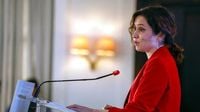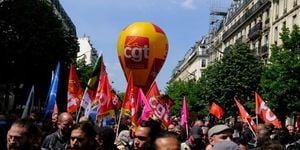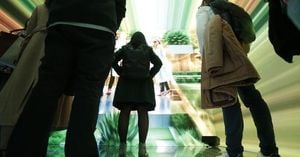On Friday, May 2, 2025, the Day of the Community of Madrid, a significant political divide was on full display as no member of the PSOE (Spanish Socialist Workers' Party) attended the official celebration organized by Isabel Díaz Ayuso's government at the iconic Puerta del Sol. Instead, the PSOE opted for a separate gathering, dubbed a "fiesta abierta" (open party), at the Rosaleda del Parque del Oeste, reflecting the ongoing tensions between the regional and central governments.
The absence of PSOE representatives at the event, which is traditionally marked by a military parade and other ceremonial activities, was notable. Ayuso's decision to exclude members of the central government stemmed from her claims that the current administration had severed "toda relación institucional" (all institutional relations) with her government. She also accused the central government of engaging in "dinámicas delictivas" (criminal dynamics) against her, a statement that underscores the heightened political animosity between the two factions.
In a statement made prior to the festivities, Óscar López, the Secretary General of PSOE-M and Minister of Digital Transformation and Public Function, announced the party's alternative celebration, emphasizing the importance of inclusivity with their event celebrating "Madrid de todos" (Madrid for everyone). López remarked, "We are committed to celebrating a Madrid that belongs to all its citizens, not just a select few." This sentiment was echoed by Mar Espinar, the PSOE spokesperson in the Assembly, who noted that this was the first time in history that the Comunidad de Madrid did not invite the central government to the Dos de Mayo celebrations.
Last year's event saw participation from key socialist figures, including Ángel Víctor Torres, the Minister of Territorial Policy and Democratic Memory, and Francisco Martín, the Government Delegate. Their involvement highlighted a collaborative spirit that has since deteriorated, especially as Torres has been vocal about the need for a plaque commemorating victims of Francoist repression, a proposal Ayuso has resisted.
As the festivities unfolded, the PSOE-M planned a show of unity at their gathering, with attendance expected from various party leaders, including Reyes Maroto, the socialist spokesperson in the Madrid City Council, and other ministers, deputies, and local officials. This gathering not only commemorates the historic uprising of the people of Madrid against French invaders in 1808 but also marks the 146th anniversary of the PSOE's founding by Pablo Iglesias Posse, whose centenary of death is being observed this year.
Meanwhile, the official celebration at Puerta del Sol, led by Ayuso, commenced with a floral tribute to the Heroes of May 2 at the La Florida cemetery before proceeding to the main venue. Despite forecasts of rain, the Comunidad de Madrid insisted on holding the event outdoors, foregoing the traditional military parade and aerial display by the Patrulla Águila, which was canceled by the Ministry of Defense.
More than 1,000 guests, including prominent figures from various sectors, were expected to attend the event, along with approximately 200 accredited journalists. Among the highlights was Ayuso's plan to award the Gran Cruz de la Orden del Dos de Mayo to 13 distinguished personalities and institutions, recognizing their exemplary contributions to society. Recipients included the renowned singer Massiel, athlete Ilia Topuria, and actor José Coronado, along with professionals who assisted during the Dana in the Comunidad Valenciana.
The political climate surrounding the celebrations was palpably tense. Rita Maestre and Manuela Bergerot, spokespersons for Más Madrid, criticized Ayuso's event as a "fiesta del PP" (party of the PP), asserting that she was appropriating the regional holiday for partisan purposes. Maestre accused Ayuso of "usurping" the festivities meant for all Madrilenians, while Bergerot expressed that the event would merely serve as a rally for PP supporters, quipping that "even Maduro wouldn't have gone this far" in politicizing a national holiday.
This year’s Dos de Mayo events not only highlight the historical significance of the uprising against foreign rule but also serve as a stark reminder of the current political divisions within Spain. With the PSOE-M's decision to hold a parallel celebration, the schism between the regional and national governments appears more pronounced than ever.
As the day progresses, it remains to be seen how these political tensions will shape future interactions between the PSOE and the Ayuso administration. The events of May 2, 2025, may well be remembered as a pivotal moment in Madrid's political landscape, reflecting broader national issues of governance, representation, and the role of political parties in commemorating shared history.
In a climate where political affiliations increasingly dictate participation in public events, the question arises: how can Madrid find common ground amidst such division? Perhaps the answer lies in embracing the spirit of unity that the Day of the Community was originally intended to celebrate.




